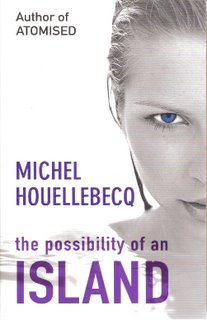 Review: The Possibility of an Island, Michel Houellebecq (2005)
Review: The Possibility of an Island, Michel Houellebecq (2005)This is a novel of ideas. As such, it is almost certain that readers will form a strong opinion of it. Its lucid, epigrammatical sentences are absorbing and entertaining. It is made up of two narrative strands, and we move along them toward understanding what the title means. I think that it has to do with the possibility of realising the potentialities of the human (Daniel) and the neohuman (Daniel25). Finding a place to live where you can do what you want. That seems to me to be the problem, as Houellebecq sees it.
He discusses the problem of relationships. Although the idea of an island suggests individuality, he seems to think that we can only really realise our potentialities through congress with other humans (or, in Daniel25's case, with other neohumans). Daniel25, near the end of the book, finds traces, after he has abandoned his compound, of Marie23. Back in the real, twenty-first century world, Daniel is tormented by his feelings and finds love in the arms of Esther. At 47, he's not exactly over the hill, but he understands that, sexually, he is pretty much going down the slippery slope (an apt metaphor in the light of right-wing politicians' recent remarks on stem cell cloning!). Esther, however, is only 25. The quality of their sexual encounters is supercharging for Daniel.
I found some ideas in this novel slightly risible. Having been married, however, and having separated from my wife, I found the following passage to be particularly apt:
When sexuality disappears, it's the body of the other that appears, as a vaguely hostile presence; the sounds, movements and smells; even the presence of this body that you can no longer touch, nor sanctify with touch, becomes gradually more oppressive; all this, unfortunately, is well known. The disappearance of tenderness always closely follows that of eroticism. There is no refined relationship, no higher union of souls, nor anything that might resemble it, or even evoke it allusively. When physical love disappears, everything disappears; a dreary, depthless irritation fills the passing days.
"When physical love disappears, everything disappears." It's so true. I remember lying awake at night with her snuggling up under the covers, willing me to approach. I remember then lying stiff and rigid, detesting her body, having lost any particle of tenderness because of the loss of desire. I remember her despair, and rejoicing in it. Naturally, she threw me out. She was quite truthful (sometimes I think she's vengeful), as a person, and perhaps I deserved nothing less. But the thing that rankles is that I didn't want to stop desiring her. It just happened.
However, there are other passages that I can't agree with, like this one:
Not only does sexual desire not disappear, but with age it becomes even crueller, more and more wrenching and insatiable — and even among those, quite rare, men whose hormonal secretions, erections and all associated phenomena disappear, the attraction to young female bodies does not diminish, it becomes, and this is maybe even worse, cosa mentale, the desire for desire. This is the truth, this is the evidence, this is what, tirelessly, all serious authors have constantly repeated.
I have not read those authors. And, furthermore, I have found that, as I age, my need for sexual gratification diminishes. And, in a way, I am glad. I remember being tormented mentally and physically, when younger, by sexual urges. These have fallen away. Now, instead of masturbating, I write on my blog. I think Houellebecq is wrong here.
I am about the same age as Daniel, and I find that I can realise my potentialities without needing a woman's touch. Is that strange? Perhaps. I fell fit and healthy, despite (or, maybe, because of) the thirty cigarettes I smoke daily.
There is also something about Houellebecq's attitude (can I call it that? Is it not, rather, simply the natural manifestation in prose of a firm belief?) that makes me a little sickened. As if nothing matters but penetrating a teenager from behind, or getting a quick blowjob under the table at a bar. Daniel seems rather lost.
The other aspect of Daniel's life that I haven't touched on yet is the religious movement. Not surprisingly for a novel of ideas which reaches into the future past the impending holocaust, Daniel gets mixed up with a bunch of people who believe that life was created by superior beings from space. They have axiomatic plans to record the DNA of their members so that they can be reborn, in the future, when the science will allow it. The religion is therefore dedicated to eternal life: in some future incarnation the faithful will meet with the Elohim. Naturally, the religion booms.
I really enjoy Houellebecq, and I recommend this book to anyone interested in modern humanity. It is often enchanting, frequently fascinating, and on occasion arousing.
2 comments:
I have started Atomised several times but just can't get into it.
Yeah, there's something light and fluffy about Houellebecq's work. But all the same it's intelligence and epigrammatical cast keeps me coming back for more. Two thumbs up for Atomised, also.
Post a Comment